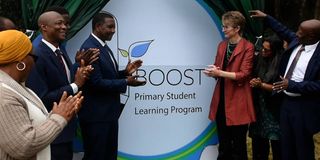How World Bank fund will improve education

What you need to know:
- This is a continuation of the ongoing efforts to alleviate the suffering of students in primary schools, many of whom have continued to enroll more students from pre-primary classes, while the lack of infrastructure and teachers has been the cry of the sector’s stakeholders for a long time.
Dar es Salaam. The government, through funding from the World Bank, has launched a programme to enhance teaching and learning in pre-primary and primary schools (BOOST) worth more than one trillion shillings.
Speaking at the launch of the initiative on Monday in Arusha, minister for Education, Science and Technology, Prof Adolf Mkenda, said the five-year programme aimed to improve the learning and teaching environment, skills and quality of teachers in teaching and enhance access to resources that facilitate service delivery at Municipal Council levels.
This is a continuation of the ongoing efforts to alleviate the suffering of students in primary schools, many of whom have continued to enroll more students from pre-primary classes, while the lack of infrastructure and teachers has been the cry of the sector’s stakeholders for a long time.
It has been a concern that secondary schools have long been given more priority when it comes to infrastructure upgrades, and although it is not the first time the World Bank has supported the education sector, experts say it is another dawn for the education sector.
“If you visit many primary schools, especially in rural areas, you will feel sorry for them. Infrastructure is poor, but when we see aid like this we are encouraged and the ministry of education must take action to bring productivity to the target areas,” Dr Amos Mbunda told The Citizen over the phone yesterday.
He said development partners would help the government cope with the poor learning environment in schools. Elaborating further on The Citizen, Prof Mkenda says in the three areas, the programme will focus on improving primary school infrastructure by focusing on needs, especially the construction of classrooms, strengthening the secure school programme, strengthening Early Childhood enrolment, improving teaching materials and methods in Pre-Primary classes.
“It will also strengthen and develop an in-service teacher training programme, strengthen teacher training centres and primary schools in the implementation of ICT curriculum in teaching and learning. Develop budget allocations to fund various educational delivery activities and strengthen governance in education,” he said.
Prof Mkenda urged all executives at the Ministry and Institutional level who will be responsible for the implementation of the various activities of the Programme to work diligently to achieve the goal each year and adhere to all the criteria and standards set to implement the programme effectively.
For his part, the World Bank Country Director, Mara Warwick, said the instinct of the institute was to see pre-primary and primary education become better, safer and more inclusive for all children required to attend school.
“We hope this BOOST programme will benefit more than 12 million students in the Mainland region. Investment in this area could be a major catalyst for poverty alleviation,” said Director Mara Warwick.





